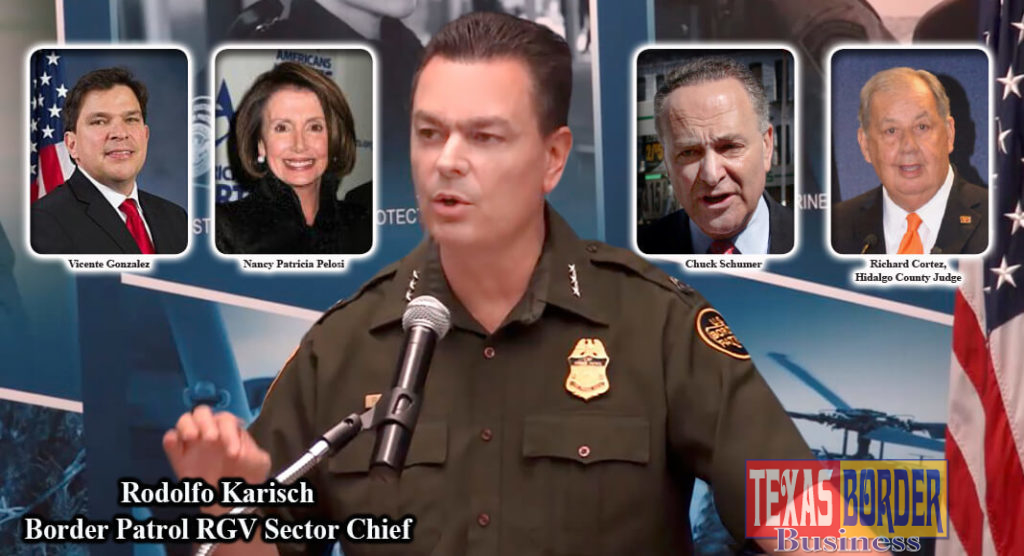The current immigration law needs to be updated, and the U. S. Border Patrol needs funding

By Roberto Hugo Gonzalez
As originally published in Texas Border Business newsprint edition April 2019
In response to the unprecedented activity of illegal crossings to the United States of men, women, and children of Central America, Rodolfo Karisch, head of the border patrol sector RGV, announced at a press conference that this situation has exceeded them and asks for help.
Chief Karisch hosted a press conference on Wednesday, March 27, 2019, to discuss the impact of the dramatic increase in apprehensions that continue to occur throughout the South Texas Corridor. He announced that significant increases in crossings at El Paso, San Diego, Yuma, and the Rio Grande Valley, have taken a toll on the men and women of the Border Patrol.
The Border Patrol is currently engaging with nongovernmental organizations like Catholic Charities. According to the chief, they are taking in a lot of people, but at some point, the Border Patrol may be forced to release Central Americans on the streets of Brownsville and McAllen.
Chief Karisch also said that in the entire southwest border, over 300,000 apprehensions have been made already during this fiscal year. “Here in RGV,” he said, “over 130,000.” The agents in this sector, last year apprehended 162,000 people for the entire year. “We’re already at 130,000 apprehensions and with more coming, projecting that we’re going to be at 260,000 easily by the end of this year.”
“We fully expect to hold the federal government accountable for any adverse consequences of these releases.”
Richard F. Cortez, Hidalgo County Judge
He is saying that it is a projected 100 percent increase across the entire border; they are definitely feeling the effects of the Central Americans crossing into the United States. Those effects are also being felt by the local community. Two days later, on Friday, March 29, 2019, Hidalgo County Judge Richard F. Cortez said that a record number of asylum-seeking families had been released into our border community. He also said, “We fully expect to hold the federal government accountable for any adverse consequences of these releases.”
Chief Karisch stated that over the last four weeks the average daily apprehensions has been over a thousand people that were taken into custody; sixty-nine percent of those coming in from Central America are families and children. Also, he said that they are taking into custody people from Bangladesh, China, India, Pakistan, Egypt, and Iraq.
“We are seeing special interest aliens that cross into this area as well. And that’s also taken away from our border security mission which should be focused on the drugs and the criminal aliens and the other bad actors who come in every day,” he stated.
“To Discuss Trump’s Manufactured Crisis on U.S.-Mexico Border.”
Congressman Vicente Gonzalez (TX-15)
Democratic Congressman Vicente Gonzalez (TX-15) sent an invitation on Saturday, March 30, 2019, to Texas Border Business and other media to attend a press conference; the headline read like this: “To Discuss Trump’s Manufactured Crisis on U.S.-Mexico Border.”
The same message has been repeated by other high-ranking Democrats like Nancy Pelosi currently serving as speaker of the United States House of Representatives, also by Senator Chuck Schumer, Senate Minority Leader. But the question is, why are they saying the opposite of what’s happening in the border? Are they totally disconnected from reality? Why do they refute the fact the U.S. border is going through a crisis caused by the exodus of Central Americans and by other elements from other countries? On top of that, the Mexican cartels are taking advantage by sending more drugs into the United States.
People that live in the border, sometimes don’t even have to be informed by the media because often they see Central Americans walking on the streets, or while sleeping on the sidewalks of businesses in the middle of the day, or just by visiting the McAllen Bus Station as Central Americans wait to board a bus to be reunited with family or friends in other parts of the U.S.
Most of the people dropped off at the bus station are people that have been sponsored by family members, many of them with notices to appear at a future court date.
“Today, we cannot safely accommodate more people in our facilities,”
Chief Karisch
The chief said that today, he cannot safely accommodate more people in their facilities because they were not built for long-term detention. “It is not something we want to do but we’re forced to release them with that notice to appear so that we can alleviate some of that overcrowding,” he said
Yes, we have a situation. A situation not seen by members of Congress, or they see it and don’t want to accept the fact that thousands of people are crossing into a sovereign country that needs to be protected.
Multiple times, the Border Patrol agents have caught real criminals, persona non grata that need to be sent back to their country of origin, in simple words, bad people.
On April 2, 2019, Kirstjen Nielsen, the Homeland Security Secretary of the United States said that the Trump Administration was treating the immigration crisis as a “Category 5 hurricane disaster.”
The situation at the border has become so severe that she even has requested military intervention; no word yet if that is going to happen. Secretary Nielsen also said that they are bringing all of the agencies together to come and help.
Meanwhile, Chief Karisch stressed that their resources are overwhelmed and outstretched. He said, “That’s why we are doing a direct release of some of these family units with children from our facilities.” He continued, “We have been forced to do that because of the incapacity of U.S. Immigration and Customs Enforcement (ICE), and the Department of Health and Human Services (HHS) is actually going to take a lot of these people from us. Our facilities were not built for this. They’re short-term facilities and our people are doing the best that they possibly can.”
Chief Karisch expressed other concerns, especially that summer is coming, which is considered a rescue season. He is already anticipating dedicating additional resources for the summer. Currently, he is taking a good number of his workforce and assigning them to process the hospital watch and transportation.
Secretary Nielsen spoke about bringing help from other agencies, and Chief Karisch corroborated those comments. He said that the National Guard and personnel from the ports of entry are helping the Border Patrol with some of the security processing and hospital transport.
“But it is still not a comfortable situation for us. We definitely need assistance from Congress in changing some of the policies that we have in place and updating our legal framework because right now some people are exploiting our immigration laws and continuing to come across. They kept claiming a credible fear as a reason for seeking asylum.
Congress is currently controlled by Democrats; they write the laws, and if they wanted, they could fix this big problem in a New York minute. Unfortunately, the way things are, Congress does not believe that we have a genuine crisis at the border, they labeled it as being manufactured by President Trump.
As Congress delays recognizing that there is a problem with enough merits for them to do their work, President Trump has applied some pressure to our neighbors to the south, Mexico.
On April 4, 2019, President Trump gave an ultimatum to Mexico to perform. He said if he did not see tangible help from Mexico on stemming the flow of immigrants across the border and if he did not see a crackdown on drugs coming across, that he would impose tariffs on cars. And if that didn’t work, then he would shut down the border. The timeline was unclear as to how much time he would give tariffs to work.
But the way I see it, this raises another question, the President brought up the topic of drugs to the negotiation table with Mexico. But the heavy drugs consumption is in the United States, and that’s driving the flow of drugs coming across. So, the question is, where to go from here?
Mexico is also a sovereign country and needs to be protected by their own government but that is not happening. Hundreds of thousands of Central Americans have crossed the country illegally into Mexico under the protection of bad actors that have made this a very lucrative business.
This year, they have arrested 135 MS13 gang members in this sector. They also arrested 18th Street gang members. “The criminal element is also taking advantage of this situation across that border.” He said, “Not a day goes by that I don’t hear that somebody with an active warrant of arrest whether it’s in this country or from other countries that we take into custody.”
In the last couple of months, they arrested an individual from Ecuador with an outstanding warrant of arrest out for murder in Spain. Border Patrol found this out through Interpol. “That speaks to the problem of what we’re seeing in addition to the special interest aliens and the criminals.” He continued, “And then we can’t also forget about the narcotics because that continues to flow daily.”
Karisch said, “We’ve got to have a sense of a consequence being delivered for that illegal activity.” He continued, “It’s imperative that Congress helps us out with the policy. So significant are the numbers here and throughout the country, which is impacting our operation.”
Statistics provided during this press conference are astonishing, but another piece of news Chief Karisch provided is that on Tuesday, March 26, 2019, the sector surpassed its high-water mark in a single day for processing over 17,500 people.
He said that the flow does not seem to subside. “We only think it’s going to get worse unless we have some major policy provisions progressively.”
This has gotten to the point that not only the immigration law has to be rewritten and updated, but like the chief said, “it also boils down to an enormous amount of funding just addressing the situation that we have here”.
The Rio Grande Valley sector has been the busiest sector in the entire nation over the last few years. The McAllen station and that’s just south of us here has been the busiest station in the Border Patrol.
The fact that Border Patrol agents are consumed with Central Americans begs the question, who is securing the other areas? Chief Karisch said that the community has to be educated on this because they have had to take in so many people and moved to do other activities that it poses significant security risks for the agents as well the for the country. He said that in the RGV sector they have had over a 465 percent increase in people from Bangladesh.
“Those are issues that we have to contend with. But we also have to get down to the business of the processing, of making sure that once these people are in our custody, they’re taken care of.” He said, “It consumes a lot of resources, that’s why we’re relying on other agencies to help us on the logistical side with it.” He continued, “Because the more people that we can dedicate to that, the more agents I can free up to get back to work,” he finalized.
Written by Roberto Hugo Gonzalez, the 2009 SBA Journalist of the Year Award Winner, and a 2009 and 2012 Paul Harris Fellow Award recipient.
Click here to read more about the state of the Texas border.














